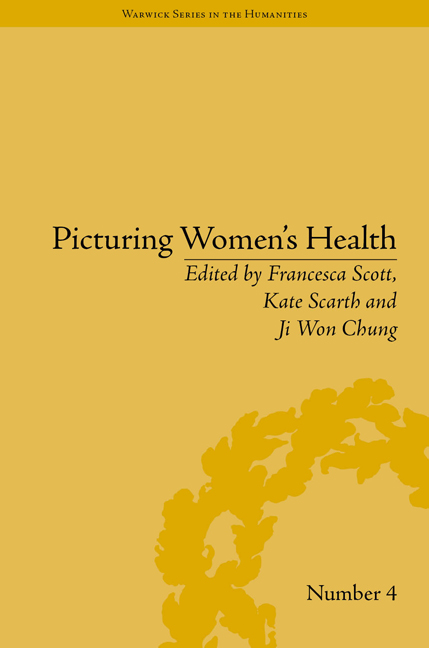Book contents
- Frontmatter
- CONTENTS
- Acknowledgements
- List of Contributors
- List of Figures
- Introduction: Picturing Women's Health
- 1 Sensibility and Good Health in Charlotte Smith's Ethelinde
- 2 Amazonian Fashions: Lady Delacour's (Re)Dress in Maria Edgeworth's Belinda
- 3 Transforming the Body Politic: Food Reform and Feminism in Nineteenth-Century Britain
- 4 Stagnation of Air and Mind: Picturing Trauma and Miasma in Charlotte Brontë's Villette
- 5 The Iconography of Anorexia Nervosa in the Long Nineteenth Century
- 6 Kate Marsden's Leper Project: On Sledge and Horseback with an Outcast Missionary Nurse
- 7 Constructs of Female Insanity at the Fin de Siècle: The Lawn Hospital, Lincoln, 1882–1902
- 8 The Fitness of the Female Medical Student, 1895–1910
- 9 Unstable Adolescence/Unstable Literature? Managing British Girls' Health around 1900
- NOTES
- Index
8 - The Fitness of the Female Medical Student, 1895–1910
- Frontmatter
- CONTENTS
- Acknowledgements
- List of Contributors
- List of Figures
- Introduction: Picturing Women's Health
- 1 Sensibility and Good Health in Charlotte Smith's Ethelinde
- 2 Amazonian Fashions: Lady Delacour's (Re)Dress in Maria Edgeworth's Belinda
- 3 Transforming the Body Politic: Food Reform and Feminism in Nineteenth-Century Britain
- 4 Stagnation of Air and Mind: Picturing Trauma and Miasma in Charlotte Brontë's Villette
- 5 The Iconography of Anorexia Nervosa in the Long Nineteenth Century
- 6 Kate Marsden's Leper Project: On Sledge and Horseback with an Outcast Missionary Nurse
- 7 Constructs of Female Insanity at the Fin de Siècle: The Lawn Hospital, Lincoln, 1882–1902
- 8 The Fitness of the Female Medical Student, 1895–1910
- 9 Unstable Adolescence/Unstable Literature? Managing British Girls' Health around 1900
- NOTES
- Index
Summary
In 1905, former Honorary Secretary of the London School of Medicine for Women (LSMW), Isabel Thorne, published a small account which celebrated thirty years of the institution. While this was intended primarily as an historical narrative describing the foundation of the School, it also contained portraits of a few illustrious and talented alumni, some of whom had died tragically pursuing their goal. The final paragraphs of the Sketch were directed firmly at the ‘successive generation of students’, those lucky ones for whom the road had ‘been cleared and the way made easy’ and whose only burden was not the individual struggle borne bravely by their predecessors but a collective weight of social and professional expectation. For the early twentieth-century female medical student, carrying ‘on the traditions handed down to them’, following ‘in the foot-steps’ of the great names meant exhibiting both skilfulness ‘in the practice of her profession, but also [as] an example to all other women for purity of mind and large heartedness’. Isabel Thorne concluded the Sketch with a flawless portrait of the ‘ideal qualities’ of the medical woman:
She should be wise and sympathetic with a clear, logical mind, much commonsense, good judgment, tact and acquaintance with human nature, able to inspire her patients with confidence. She is brought into close contact with so many of her fellow creatures, has so much varied experience of trying situations, that she requires not only a profound knowledge of medicine and surgery, but a firm grasp of the principles underlying them and the faculty of applying what she knows to suitable cases. She must be unselfish with a great capacity for taking pains. […]
- Type
- Chapter
- Information
- Picturing Women's Health , pp. 139 - 158Publisher: Pickering & ChattoFirst published in: 2014



